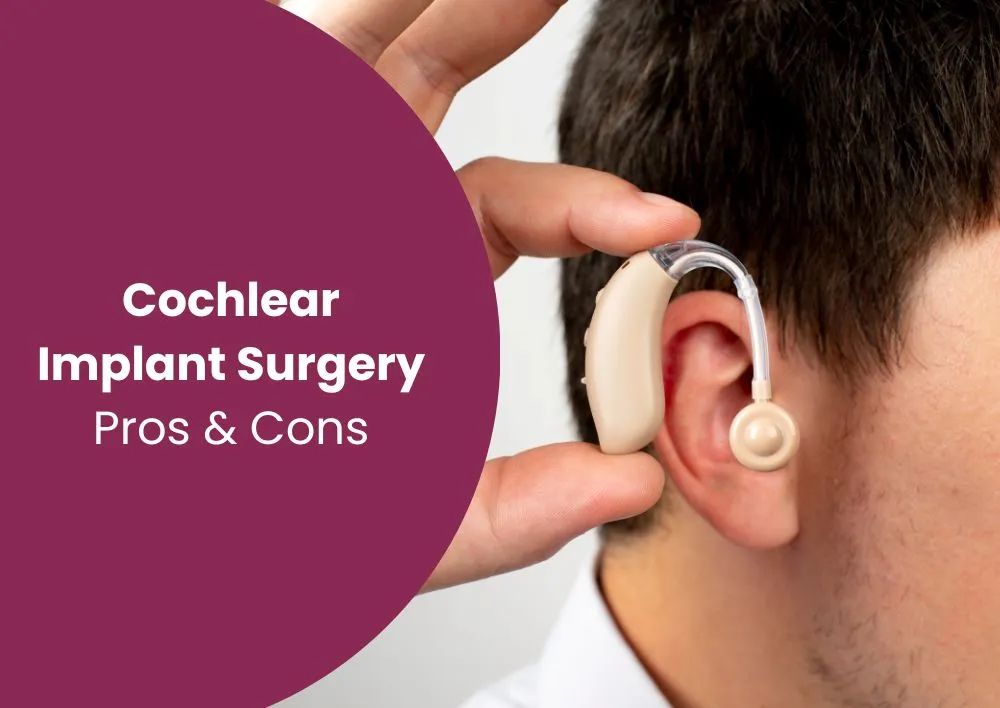Cochlear Implant Surgery: Pros and Cons
Cochlear implant surgery is a revolutionary solution for individuals facing profound hearing loss. This medical procedure helps restore or enhance hearing abilities. Unlike traditional hearing aids, which amplify sounds to make them audible, cochlear implants work by directly stimulating the auditory nerve to provide a sense of sound to the brain. The procedure involves implanting a small electronic device, known as a cochlear implant, under the skin behind the ear.
If you are looking for the best hospital for cochlear implant surgery in Gurgaon, Miracles Apollo Cradle/Spectra is the best option you can count on. We have a team of highly experienced and qualified cochlear implant surgery specialists, who will be by your side from the beginning of your journey.
While cochlear implant surgery helps individuals reconnect with the world of sound, it is crucial to weigh the pros and cons before making a decision. In this blog post, we will delve into the advantages and disadvantages of cochlear implant surgery, providing valuable insights for those contemplating this transformative procedure.
What is the Difference Between a Cochlear Implant and a Hearing Aid:
-
Cochlear Implant: Cochlear implants are electronic devices surgically implanted under the skin behind the ear. They directly stimulate the auditory nerve to provide a sense of sound to the brain. Cochlear implants are designed for individuals with severe to profound hearing loss, especially those with damage to the hair cells within the cochlea.
-
Hearing Aid: On the other hand, hearing aids are external devices that amplify sounds to make them audible to individuals with hearing loss. They do not directly stimulate the auditory nerve. They are best suited for individuals with mild to moderate hearing loss.
What are the Types of Cochlear Implants?
The types of cochlear implants can vary based on the location of the external sound processor, a crucial component of the cochlear implant system. The external sound processor can be positioned behind the ear, attached to clothing, or mounted on the scalp.
Why Cochlear Implants are Needed?
Cochlear implants become essential when individuals experience severe to complete hearing loss. Reasons for considering cochlear implants include:
-
Ineffective Hearing Aid Use: Cochlear implants may be necessary when hearing aids no longer provide sufficient benefit.
-
Complete Hearing Loss: Individuals with complete hearing loss, where the hair cells in the cochlea are severely damaged, can benefit from cochlear implants.
-
Communication Challenges: Cochlear implants address difficulties in understanding speech, especially in noisy environments.
-
Limited Benefit from Amplification: When traditional amplification methods fail to yield significant improvement, cochlear implants become a viable solution.
What Happens During Cochlear Implant Surgery?
Cochlear implant surgery involves the placement of a cochlear implant, an electronic device designed to stimulate the auditory nerve directly. The Cochlear Implant Surgery typically follows these steps:
-
Preparation: Before the surgery, the patient undergoes a thorough evaluation, including medical assessments, hearing tests, and imaging studies (such as CT scan or MRI scan) to ensure they are a suitable candidate for a cochlear implant.
-
Anesthesia: The surgery is typically performed under general anesthesia to ensure the patient is unconscious and does not experience pain during the procedure.
-
Incision: The surgeon makes an incision postauricularly (behind the ear) to access the mastoid bone, which is part of the skull bone.
-
Mastoidectomy: The surgeon may perform mastoidectomy to create a small well in the bone to insert the implant, providing access to the cochlea.
-
Cochleostomy: A small opening is made in the cochlea, the spiral-shaped structure in the inner ear responsible for hearing. The electrode array of the cochlear implant is then carefully inserted into the cochlea through this opening.
-
Implant Placement: The internal component of the cochlear implant, consisting of the receiver-stimulator and electrode array, is carefully placed inside the well created in the mastoid bone. Subsequently, the electrode array is inserted into the cochlea through the small opening.
-
Closing Incisions: The incisions are closed meticulously with sutures or staples to ensure optimal healing, and the surgeon may place a dressing around the surgical site to prevent infection.
-
Activation (Programming): After a period of healing, generally a few weeks, the external component of the cochlear implant, including a speech processor and a microphone, is fitted and activated. During this crucial step, the device is programmed to the specific needs and preferences of the individual.
-
Rehabilitation: Following activation, the patient undergoes rehabilitation to learn how to interpret the signals provided by the cochlear implant. This may involve working with audiologists, speech therapists, and other professionals to optimize the use of the device.
How Long Does it Take to Recover After Cochlear Implant?
Recovery time after cochlear implant surgery varies from patient to patient. While many individuals can resume normal activities relatively quickly after the procedure, full adaptation to the cochlear implant may take time.
It's important to note that the timeline for recovery and adjustment can differ based on individual factors. Some patients may experience a more rapid adaptation, while others may require additional time. Follow-up appointments with the cochlear implant team are crucial for monitoring progress, addressing concerns, and making any necessary adjustments to optimize the device's performance.
Always consult with your cochlear implant surgery specialist for personalized guidance based on your specific situation.
Pros of Cochlear Implant Surgery
Cochlear implant surgery can offer several benefits for individuals with severe to profound hearing loss. Here are some of the key benefits associated with cochlear implant surgery:
-
Improved Hearing Abilities: Cochlear implant surgery can greatly improve hearing abilities in individuals with severe to complete hearing loss. It provides access to once-unreachable sounds.
-
Enhanced Speech Perception: The surgery can improve speech perception and comprehension, and enable recipients to better understand spoken language, even in noisy environments.
-
Increased Quality of Life: Many recipients apprise a significant improvement in their overall quality of life after a cochlear implant, as they can engage more effectively in social activities, communicate with others, and experience a fuller range of auditory sensations.
-
Early Intervention for Babies: Cochlear implant surgery is beneficial for babies born with hearing loss, allowing for early intervention and the development of fundamental language and communication skills.
-
Customization and Adaptability: Modern cochlear implants offer customization options, allowing audiologists to tailor the devices to the specific needs of each individual. They are also flexible to technical advancements, ensuring that recipients can benefit from future improvements.
Cons of Cochlear Implant Surgery:
Here are some potential side effects or cons associated with cochlear implant surgery:
-
Surgical Risks: Like other surgical procedures, cochlear implant surgery also poses side effects, such as infection, bleeding, and complications related to anesthesia.
-
Cost and Accessibility: The cost of cochlear implant surgery, coupled with rehabilitation expenses and ongoing maintenance, can be substantial. Access to these procedures may also be limited in certain regions, rendering them inaccessible to specific individuals.
-
Rehabilitation: Adjusting to the new auditory input provided by cochlear implants requires time and effort. Recipients need to undergo rehabilitation and extensive training to maximize the benefits of the implants, a process that can be challenging.
-
Variable Outcomes: The effectiveness of cochlear implants can vary from person to person. While many individuals experience significant improvements, some may have more limited success in terms of speech perception and sound discrimination.
-
Device Limitations: Cochlear implants may not fully replicate natural hearing, and users may encounter limitations, particularly in distinguishing certain sounds or experiencing a more nuanced auditory experience.
Conclusion:
Cochlear implant surgery stands as a transformative option for individuals grappling with profound hearing loss, providing an opportunity to reconnect with the auditory world. However, like any medical intervention, it entails both advantages and disadvantages. Prospective candidates must thoughtfully weigh the potential benefits against the associated risks and challenges. Consultation with a cochlear implant surgery doctor and a thorough consideration of individual needs and circumstances are crucial steps in making an informed decision about cochlear implant surgery.
If you have read about cochlear implants and their pros and cons, you may be wondering whether you are the right candidate for the procedure. The best way to determine this is to consult with the best cochlear implant surgeons at Miracles Healthcare. Here, you will undergo a diagnostic examination to assess whether cochlear implants could aid in your hearing loss. Our team of cochlear implant surgery doctors in Gurgaon will determine the best course of treatment for any hearing loss based on the findings of the examination. The hospital provides comprehensive healthcare services through multiple facilities: Miracles Apollo Cradle, Miracles Apollo Cradle/Spectra, Miracles Fertility & IVF Clinic, and Miracles Mediclinic. Conveniently situated in Sec 14, Sec 56, and Sec 82, these locations aim to enhance daily healthcare accessibility for Gurgaon residents.
Take the first step towards hearing recovery and schedule your consultation online with a cochlear implant surgeon near you at Miracles Healthcare today!





_in_Pregnancy.webp)






Was the information useful?
0 0